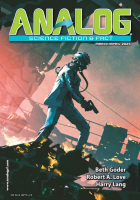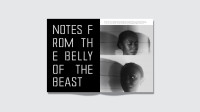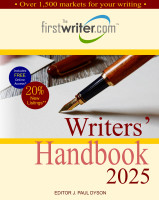firstwriter.com's database of magazines includes details of 2,201 English language magazines from around the world. The database is continually updated: there have been 20 listings added or updated in the last month, and the database was last updated yesterday, April 3. With over a dozen different ways to narrow your search you can find the right magazine for your writing, fast.
News
Comedian Will BF has launched a magazine for alternative comedy writing.
Co-created with comedy producer Amber Ash, the first 36-page edition features contributions from Rosalie Minnit, Alex Franklin, Rosie Nicholls and more.
Will BF said: ‘There didn’t seem to be any spaces for creating surreal, spontaneous, and – most of all – creative written comedy with a little heart and just for the sake of it. I craved a space where I could write
something with a bit more joy than Will BF’s Guide To A Perfect Fringe, sandwiched between ad-crammed pages.
‘I hope the freedom of format and content is something that contributors and readers alike will find refreshing. With only one edition down - I hope Chaff will continue to grow, spread and mutate - like a lovely virus
The magazine has been funded by Croydon Council – despite the authority having a £1.6billion debt – and is available for £5 on Etsy.

Alfred Hitchcock’s Mystery Magazine, Analog Science Fiction and Fact, Asimov’s Science Fiction, Ellery Queen Mystery Magazine, and The Magazine of Fantasy & Science Fiction have been acquired by Must Read Magazines, a division of a new publishing company, Must Read Books Publishing. All editorial staff from the magazines have been retained in the acquisitions. Jackie Sherbow has been promoted to editor of Ellery Queen Mystery Magazine. P.L. Stevens joins the group as publisher.
From Stevens’ statement to Locus:
There are writers who have posted online asking if the magazines have somehow been taken over by unusual interests and we want to reassure people that’s not the case. Ultimately the magazines’ content will remain editorially driven as they have always been, and they might be interested to know that one of our largest single outside financial backers, Michael Khandelwal, is a lifelong regional con attendee (more below). We feel these magazines are extremely important to the legacy and future of these genres, and hope to continue each magazines mission while updating the business behind the magazines in order to reach more readers and writers. The acquisitions were necessary for the magazines to survive and hopefully thrive in the changing publishing economy….
In recent years, magazines have faced significantly rising costs and lower payments from certain retailers.
The company plans to bolster the magazines by expanding their distribution in trade bookstores, increasing their digital footprint, investing more in marketing the magazines to new readers and writers across channels, and using their platform to promote genre fiction authors in general….
As always, the creative missions of the magazines are driven by their longtime editorial staff.

Stroud Book Festival is delighted to announce that The Laurie Lee Prize for Writing 2025 is now open for entries, writes Caroline Sanderson.
Free to enter, the Laurie Lee Prize for Writing was created in 2022 to acknowledge and honour the work of Stroud’s most famous son, Laurie Lee (1914-1997). It was established under the umbrella of Stroud Book Festival with the blessing of Laurie Lee’s family, and his literary estate. The 2024 winners were Laura Kinnear and Estella Jones.
The Prize is open to unpublished writers currently resident in Gloucestershire, and to those who were born in the county. The criteria also now permit entries from anyone studying at school or university or working in Gloucestershire.
The theme for this year’s prize is JOURNEYS, and submitted writing on that theme can be fiction, non-fiction or poetry.
Articles
Australia’s literary journals are produced in a fragile ecosystem propped up by a patchwork of volunteer labour, generous patrons and, with any luck, a small slice of government funding.
The Sydney Review of Books, the Australian Book Review and Overland were among a group of publications who sought four-year funding from the Australia Council in 2020 but were unsuccessful.
These publications join the ranks of many others – among them Meanjin and Island – defunded by state or federal arts funding bodies in recent years.

At CNN, Leah Asmelash laments the demise of many “long-standing” literary magazines. “The Believer,” she writes, which was started in 2003, “was once at the top of the literary magazine game. A leading journal of art and culture, the Believer published the work of icons like Leslie Jamison, Nick Hornby and Anne Carson. It won awards, it launched careers.” But the University of Nevada, which has housed the magazine since 2017, announced that it was shutting it down: “In a statement explaining the decision, the dean of the school’s College of Liberal Arts called print publications like the Believer ‘a financially challenging endeavor.’”
Oh, boy. Leslie Jamison, an icon? The Believer, a publication that “launched careers”? The only thing missing here is some theme music and a “CNN exclusive” or two.
Asmelash goes on to write about a handful of literary magazines housed at universities with MFA programs that are also shutting down — the Alaska Quarterly Review and the Sycamore Review, among others. We get the predictable “It wasn’t always this way” about halfway through:

For avid readers, sometimes books can lose their appeal. You might get burned out or are unable to find the joy in keeping up with all the latest book releases. You could take a break in reading altogether, but there are other opportunities to level up your reading skills while putting your eye for detail to good use. One of those opportunities to become a literary magazine reader.
I had the great privilege of reading for two literary magazines in the past — The Missouri Review and The Masters Review — and both experiences proved invaluable to me as a reader and writer. It opened up my eyes to the blood, sweat, and tears that editors and readers put into these small but mighty publications. From a writer’s perspective, it also created an added respect for editors.

Editor-in-chief Dan Crowe, and Pentagram partner, designer and former New York Times Magazine art director Matt Willey uncover the process behind issue two of the magazine that will only have ten.
Who doesn’t feel it? Being perplexed at how we’re going to define this generation. Living in the age of information, where stories from near and far are accessible at just a click, and the allure of the most revered crumbles under increased access to their lives and methods, it’s no wonder that a highlight reel may not be so easy to assemble. But, in the case of Inque magazine, literature is a powerful force that can remind us of the power of our collective now, in just ten years, with a projected ten issues, in a feat to memorialise the 2020s. “Every issue is its own adventure; tracking down new writers, or finally getting in touch with someone I’ve always wanted to work with,” Dan Crowe, the magazine’s editor-in-chief tells us of his journey to commissioning the likes of Annie Ernaux, Sheila Heti and Stephen Fry for its second issue.
Dan, as with all of us, has seen an increase in writers, publishers and magazines throughout the literary sphere. “But, sometimes I wish for there to be an explosion of a new and interconnected group of authors, like a new Martin Amis, Ian McEwan, Julian Barnes and Salman Rushdie hegemony, a diverse and younger school,” he tells us. “And, this seems to occur when there is a coherent force to fight against, a common enemy, and everything just feels so fractured now.” In an effort to bind this generation’s efforts, designer Matt Willey creates with the knowledge that Inque may never make sense until the decade-long ride is over. “It takes on a shape; there’s a beginning, middle and end. Like in Agnes’ photo booth series; she will change over the course of a decade, she will age, life will change and things will be different,” Matt adds.
Submit a listing
If you run, are involved in, or just know of a magazine not included in our magazines database, you can suggest a new listing by clicking here. You can also use this form for suggesting amendments to existing listings.
To view our inclusion policy, click here.






